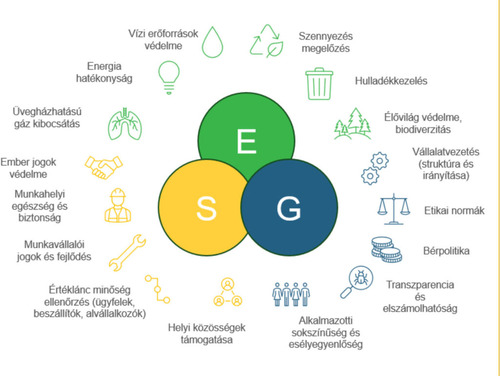What Does ESG Mean?
ESG is an acronym for Environment, Social, and Governance.
- The first element covers, among other things, the reduction of greenhouse gas emissions, minimizing the harmful effects of waste and water management, and improving energy efficiency.
- The second refers to the proper treatment of employees, maximizing workplace safety, implementing equal opportunities in practice, and maintaining strong relations with local communities.
- The third pillar examines, among other aspects, the internal management structure of institutions, strengthening the theoretical framework for equal opportunity, ensuring transparency, establishing ethical norms, and creating cybersecurity conditions.
These pillars align with the United Nations Sustainable Development Goals (SDGs).

ESG, as a concept, is both an analytical and organizational framework. It balances environmental and social sustainability considerations with financial, educational, and academic performance in everyday operations and strategic decision-making. Its aim is to maximize transparency. Since the framework is strongly data-driven, ESG reports enable meaningful comparisons. Developing ESG practices can have a favorable impact even in the medium term on an institution’s financial performance and, in the case of Obuda University, on the satisfaction, physical and mental health of its students and employees, as well as on its rankings in international university lists.
Today, ESG has become an indispensable framework for investors, companies, and a growing number of stakeholders when evaluating institutions. In the European Union, including Hungary, specific regulations define the steps, risk management systems, and preventive measures related to the implementation of ESG. Sustainability and ESG go hand in hand. While sustainability refers to the desired end goal, ESG provides the framework for achieving it. Obuda University is committed to building a world where resources are inexhaustible and emissions and pollution are reduced to a level that ensures environmental cleanliness and livability. In parallel, the University also aims to achieve social sustainability, promoting full equality and the well-being of all. For this reason, Obuda University follows the model of “strong sustainability” rather than “weak sustainability,” meaning that environmental and social dimensions are not treated as separate areas. In this approach, economic performance is interpreted as the result of social activity, while society itself is considered an integral and inseparable part of the natural environment.

Why Is ESG of Outstanding Importance for the University?
The ESG approach (focusing on environmental, social, and governance factors) is crucial for the University because our goal is to lead in value creation as well as in preserving and sustainably enhancing existing values. As a conscious and responsible institution, Obuda University strives to understand its stakeholders, their expectations, needs, and challenges in depth. To this end, the University maintains ongoing, two-way dialogue with them, thereby strengthening the quality and effectiveness of cooperation.
With the active involvement of stakeholders—especially students and academic staff—the University has identified the key focus areas that form an integral part of its ESG development process. The institution’s primary stakeholder groups are:
- Academic staff
- Students
- Parents of students
- Local communities
- Non-academic staff
- Partner universities
- Partner companies
- Society at large
Through stakeholder involvement, the University has defined the priority areas essential to our shared future, focusing its resources on these. At the same time, under the ESG Strategy, the University also actively addresses all other relevant areas, setting specific objectives and actions for each.
In higher education, particularly at the university level, beyond the central role of students as stakeholders, ESG expands with additional dimensions:
- Research Dimension: How much the University’s research and studies contribute to environmental and social goals.
- Educational Dimension: Graduates of Obuda University gain knowledge that enables them to contribute to climate protection and social goals throughout their careers.
- Ranking Dimension: All major university ranking institutions publish sustainability and impact lists, and positions on these rankings indirectly affect student enrollment and the quality and quantity of partnerships.
When shaping its ESG development objectives, the University also considers the UN Sustainable Development Goals (SDGs), which define global environmental and social objectives across 17 main goals and 231 sub-targets. Among these, Obuda University contributes primarily in the field of quality education, but also focuses strongly on industry, innovation, and infrastructure; clean energy; sustainable cities and communities; action against climate change; and equal opportunity.

What Are We Doing to Improve Our ESG Performance?
As part of its ESG development program, the University has implemented or is implementing the following steps with the involvement of experts:
- Benchmark Analysis: Conducted a comprehensive study of five regional higher education institutions of similar profile, size, and background, as well as four globally outstanding universities, in order to identify best practices in ESG development.
- Status Assessment: Carried out a detailed audit covering six main and twenty-seven sub-areas, which allowed us to identify areas for development and establish a timeline for them.
- Materiality Analysis: Through stakeholder surveys and detailed evaluation, we identified highly important, important, and moderately important areas. Based on this, the University’s experts set appropriate goals to ensure that operations and activities have the most favorable direct and indirect impacts possible on stakeholders.
- Internal Training Material: Made available a six-part digital training package for all employees, covering the background, steps, and theoretical knowledge of ESG development. Studying this material was made mandatory for managers.
- ESG Strategy: Based on its strengths, the results of the status assessment, and the materiality analysis, the University developed its own ESG strategy, the official adoption of which is expected in 2025.
- Organizational Transformation: Established the Sustainability Council, the ESG Committee, and the Student and Employee Well-being Committees to manage priority areas more effectively. The head of ESG development at Obuda University is the Chair of the Sustainability Council, who is also the Vice Rector for Sustainability and Major Developments.
- Key Performance Indicators (KPIs): Experts compiled a list of ESG-related indicators, including the necessary accompanying parameters, data owners, and, where relevant, target values.
- ESG Report: The preparation of Obuda University’s first ESG report is in progress and is planned to be published for the year 2025.
- ESG Training Programs: In line with our core mission, we are launching several ESG-related academic programs, not only at the course level but also as independent degree programs—for example, the ESG Consultant Postgraduate Specialist Program, which is legally required for professionals working in the field.
Improving Operational Efficiency in ESG Areas
The University has launched numerous projects aligned with the actions set out in the ESG Strategy. These initiatives aim to increase energy efficiency, promote innovation, strengthen cybersecurity and data protection, and ensure student and employee well-being and equal opportunity.

